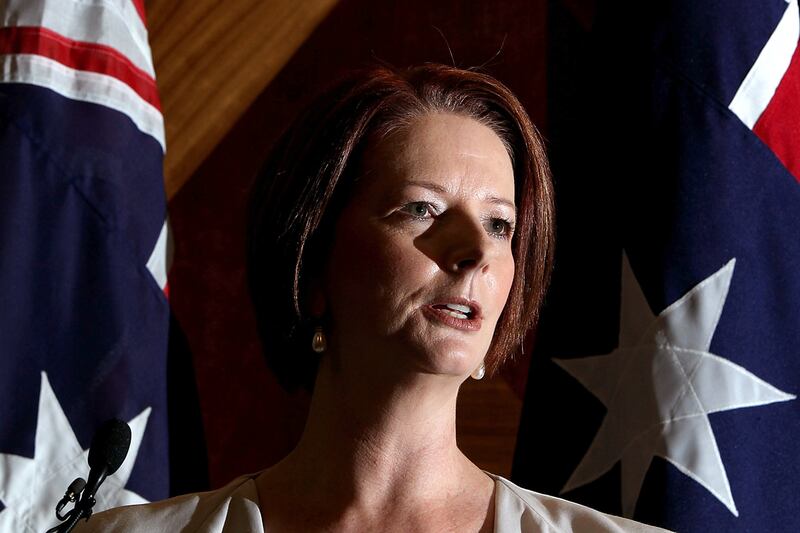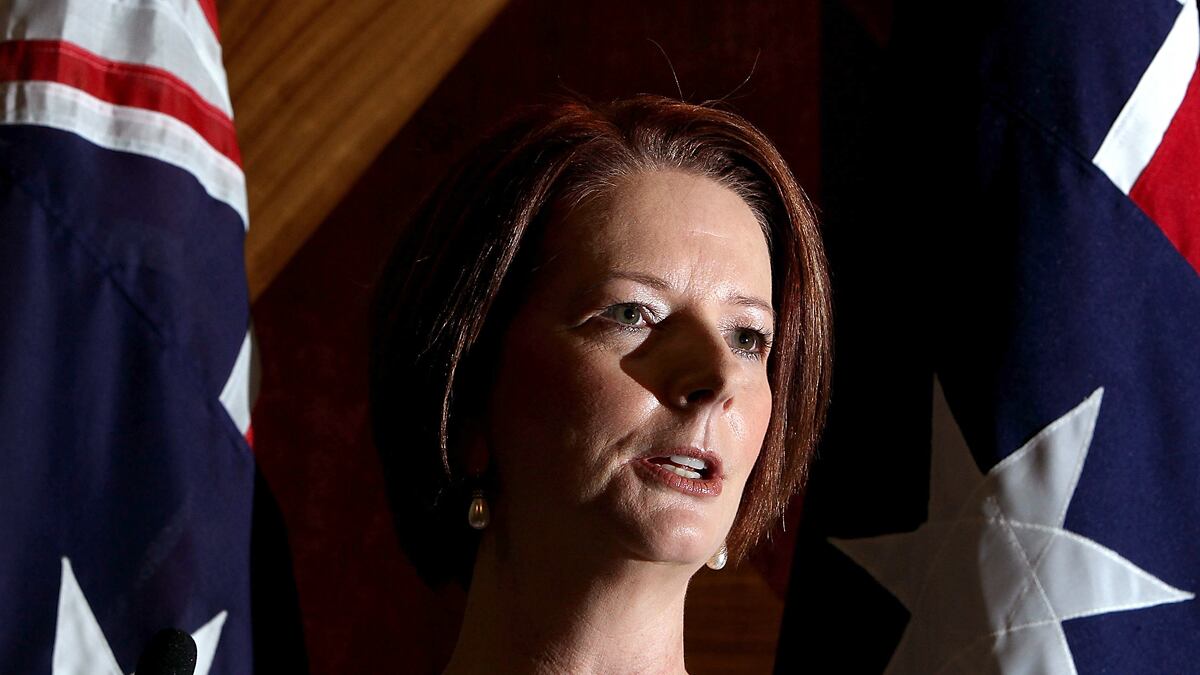When Julia Gillard was elected Australia’s first female prime minister, it was, in many ways, an enormous coup. She exploded the mold: she was unmarried; had no children; sported flaming red hair; and spoke in a broad, unaffected accent. She was also a canny, self-deprecating pragmatist who was smart and unpretentious. The fact that she was a woman seemed to be irrelevant. She wielded power the way men have, negotiating, dealing, and kicking heads when necessary.
The only problem was, because she deposed a popularly elected prime minister, Kevin Rudd—who has been perceived as a victim ever since—she has struggled to establish her legitimacy as a leader. The core problem of her prime ministership has been authority.
Authority, as any female politician knows, has historically been much harder for women to prove they have when in a job usually occupied by men. So in many ways, the question of whether you have the right to your job in the first place is about the worst credibility problem a woman leader can have.
Especially when you haven’t done a great job.
Now we have the odd situation where a current sitting prime minister (Gillard) who is polling poorly is being challenged because it was wrong to challenge a former sitting prime minister (Rudd) just because he was polling poorly.
While Gillard was a capable, well-respected cabinet minister, she has disappointed as a P.M. because of her failure to communicate her successes, and the lack of coherence of her legislative agenda. She has broken promises to those who helped her form government; performed in a stiff, unconvincing way; and seemed lost in a barrage of conflicting advice about how to project authenticity.
In challenging Rudd in 2010, was she being an assertive, ambitious Labor Party star who truly believed the party had lost its way under his leadership? Or was she the puppet of “faceless men,” factional apparatchiks who had tired of an autocratic leader who had dropped in the polls?

The latter narrative became dominant in the media. Halfway through the 2010 election campaign, Gillard alluded to the idea that political spin doctors had too much control, saying: “I think it’s time for me to make sure that the real Julia is well and truly on display, so I’m going to step up and take personal charge of what we do in the campaign from this point.”
Reporters leapt on the “real Julia” phrase as a sign of lack of command, and it became more and more pertinent as she began to seem less and less like herself.
Unfortunately for Gillard, who has a strong personal rapport with Obama, the debate about her warmth has obscured the real gains she has made: forming a minority government through a round of complex negotiations, passing a carbon tax, as well as the passage of a bill placing a tax on Australia’s nonrenewable resources through the lower house.
It has also obscured a deeper question of what it is we require our leaders to be. Should they be appealing as well as effective? Or is this something we only ask of women? Several commentators and politicians have remarked on the intensity of the vitriol against Gillard, evident in offensive sexist jibes like “ditch the witch!” placards at rallies or being called a “menopausal monster” or “lying cow,” as well as the call from right-wing broadcaster Alan Jones to put her in a body bag and dump her out at sea.
Gillard spoke about this in a recent TV interview, saying, “I don’t remember people looking at [former prime minister] John Howard and saying, ‘Gee I wish he’d be warmer and cuddlier and more humorous.' … They looked at him and said, ‘Well, he’s the bloke running the country,’ and I think the same standard should apply to me. I’m a woman running the country.”
For now. The ballot on Monday, of Rudd versus Gillard, is seen as a test of his popularity against her competence. Rudd is liked by Australians, and Gillard is liked by her colleagues.
Rudd is polling ahead of both Gillard and the conservative opposition leader, Tony Abbott, as preferred prime minister. But he still lacks the numbers in the party room and, at this stage, looks unlikely to win tomorrow’s ballot. The question is how much Gillard will win by, and whether she will be able use the win to quash dissension, somehow pull Rudd into line, and win back public trust.
It may yet be the making of her.
Last week, at a press conference, a noticeably feistier, more candid Gillard rebuked a reporter for rudeness. Journalists were thrilled. Asked how she could possibly win the next election, with her party publicly brawling, Gillard spoke about her courage and “inner personal fortitude.” She explained, “People who know me would know stoicism is amongst my key attributes.”
I have often wondered if Gillard is getting conflicted messages about how women in politics should be because we have such conflicted attitudes: be strong but not too strong! Be warm but not weak, compassionate but still tough, friendly but still authoritative. Do what it takes to win—but don’t admit to ambition.
It’s a tightrope she slipped off months ago.
Her bête noire may yet help her clamber back on.






